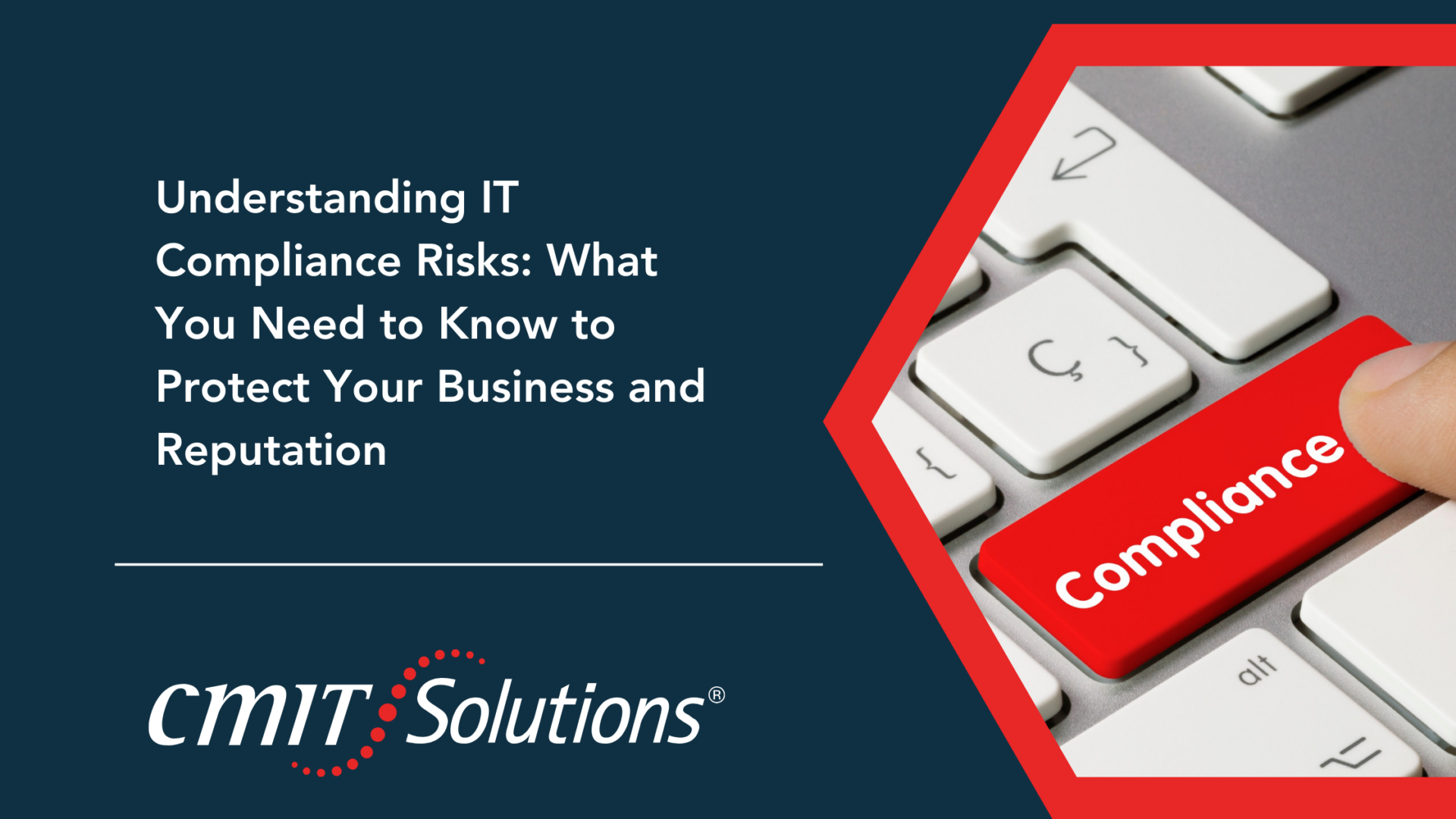- IT compliance protects your business from legal, financial, and cybersecurity risks while ensuring regulatory adherence.
- Non-compliance can lead to data breaches, reputational damage, and costly penalties.
- CMIT Solutions of Fort Lauderdale offers expert assessments, monitoring, and training for long-term compliance.
IT compliance is an essential aspect of running a secure and successful business in today’s digital landscape. As cyber threats evolve and data protection regulations become more stringent, failing to meet compliance requirements can have severe financial, legal, and reputational consequences. Ensuring that your IT infrastructure adheres to relevant regulations is not just about avoiding penalties—it is about building a trustworthy brand, safeguarding sensitive information, and maintaining smooth business operations.
Understanding the risks associated with IT compliance and taking proactive measures can help you avoid costly mistakes and strengthen your cybersecurity posture.
What Is IT Compliance?
IT compliance refers to the process of ensuring that your organization’s technology, systems, and data management practices align with relevant legal, regulatory, and industry-specific standards. These regulations exist to protect customer data, prevent cyberattacks, and ensure operational integrity. Compliance is not a one-time activity but an ongoing commitment to meeting security and privacy requirements.
Common Compliance Frameworks
Listed below are a few common compliance frameworks:
- GDPR (General Data Protection Regulation): A European regulation that enforces strict data protection and privacy rules for businesses handling the personal data of EU citizens.
- HIPAA (Health Insurance Portability and Accountability Act): A U.S. regulation that protects sensitive patient health information from unauthorized access and disclosure.
- PCI-DSS (Payment Card Industry Data Security Standard): A set of security standards designed to protect cardholder data and ensure secure payment processing for businesses handling credit card transactions.
- CMMC (Cybersecurity Maturity Model Certification): A framework developed by the U.S. Department of Defense to ensure that contractors meet cybersecurity standards to protect sensitive government information.
- SOC 2 (Service Organization Control 2): A compliance standard for technology and cloud-based service providers, focusing on data security, availability, processing integrity, confidentiality, and privacy.
- ISO 27001 (International Security Standard): A globally recognized standard for information security management systems (ISMS), helping businesses protect data through risk management and best practices.
The Most Common IT Compliance Risks for Small Businesses
IT compliance risks can stem from various sources, including outdated security practices, lack of employee awareness, and insufficient documentation. Failing to address these risks can lead to data breaches, regulatory fines, and reputational damage. Understanding the most common compliance risks will help you take the necessary steps to mitigate them.
Data Breaches and Unauthorized Access
Cybercriminals actively seek vulnerabilities in business networks to gain unauthorized access to sensitive data. Weak passwords, outdated software, and unpatched systems increase the likelihood of a breach.
If hackers gain access to customer or financial data, your organization could face heavy fines and loss of trust. Implementing strong authentication protocols, regularly updating security patches, and monitoring network activity can help reduce the risk of data breaches.
Non-compliance with Industry Regulations
Regulatory bodies impose strict rules to ensure businesses handle customer data responsibly. Failure to comply with these regulations can result in costly penalties and legal consequences. Businesses that fail to meet HIPAA requirements, for example, risk fines that can range from thousands to millions of dollars. Regular audits and clear compliance policies can help keep your organization aligned with industry regulations.
Insufficient Data Encryption and Storage Practices
Storing sensitive information without encryption leaves it vulnerable to unauthorized access. Many businesses neglect to encrypt data at rest or in transit, increasing the risk of exposure during a breach.
If sensitive data is compromised, it can lead to identity theft, financial fraud, and loss of consumer confidence. Encrypting all critical data and using secure cloud storage solutions with end-to-end encryption ensures that even if a breach occurs, the stolen data remains unreadable to unauthorized individuals.
Poor Vendor and Third-Party Risk Management
Your business likely relies on third-party vendors for IT services, cloud storage, or software solutions. However, failing to assess and monitor the security practices of your vendors can expose you to compliance risks.
If a vendor fails to meet compliance standards, your business could be held accountable for their shortcomings. Establishing strict security requirements for vendors, regularly auditing their compliance, and ensuring they follow best security practices can help protect your business from third-party risks.
Inadequate Employee Training and Awareness
Employees play a crucial role in maintaining IT compliance, yet many businesses, especially small and medium businesses, fail to provide sufficient training on security best practices. Phishing attacks, weak passwords, and improper handling of sensitive data are common risks caused by human error. Without ongoing training, employees may inadvertently compromise security and expose the organization to compliance violations.
Lack of Proper Documentation and Audit Trails
Compliance audits require businesses to provide clear documentation of security policies, data protection measures, and incident response procedures. Many small and medium businesses lack organized records, making it difficult to demonstrate compliance when needed.
Without proper audit trails, proving adherence to regulatory standards becomes a challenge, and non-compliance penalties may follow. Maintaining detailed records of security activities, access logs, and compliance policies ensures you are prepared for audits and regulatory reviews.
The Business Impact of IT Compliance Failures
Failing to meet IT compliance standards can have far-reaching consequences that affect every aspect of your business. From financial losses to operational disruptions, the impact of non-compliance can be severe and long-lasting.
Legal and Financial Consequences
Non-compliance often results in hefty fines and legal actions from regulatory bodies. Businesses that fail to meet industry standards may face lawsuits, settlements, and increased insurance costs. These financial burdens can strain resources and impact long-term growth, making compliance a necessary investment for any business.
Reputation Damage
Customers and partners expect businesses to handle sensitive information with care. A compliance failure or data breach can erode trust, leading to customer loss and a damaged brand reputation. Rebuilding trust after an incident takes time and effort, especially for small and medium businesses; sometimes, they never fully recover.
Operational Disruptions
When compliance issues arise, businesses may be forced to halt operations to address security gaps and regulatory concerns. Investigations, audits, and remediation efforts can disrupt productivity and lead to lost revenue. Ensuring continuous compliance helps prevent such interruptions and maintains business continuity.
Cybersecurity Risks
Non-compliance often correlates with weak cybersecurity measures, making small and medium businesses attractive targets for cybercriminals. Without proper safeguards in place, companies risk ransomware attacks, data theft, and system shutdowns. Strengthening security protocols and maintaining compliance reduces these risks and protects both business and customer data.
Steps to Identify and Mitigate IT Compliance Risks
Mitigating IT compliance risks requires a proactive approach that includes audits, security measures, employee training, and continuous monitoring. Establishing a structured compliance strategy helps prevent violations and ensures your business remains secure.
Conduct Regular Compliance Audits
Regular compliance audits help identify security gaps and potential vulnerabilities before they become serious issues. Internal audits, third-party security assessments, and penetration testing can uncover weaknesses in your IT infrastructure. Addressing these gaps promptly ensures you remain compliant and minimize security risks.
Implement Robust Access Controls and Encryption
Unauthorized access to sensitive data is a major compliance risk. Implementing strong access controls, such as role-based access control (RBAC), ensures employees only have access to the data they need. Encryption further protects data by rendering it unreadable to unauthorized individuals. Multi-factor authentication (MFA) and strict password policies add additional layers of security.
Stay Up-to-Date with Regulatory Changes
Regulations constantly evolve, and failing to stay updated can lead to compliance lapses. Assigning a compliance officer or security team to monitor regulatory updates helps ensure your business adapts to new requirements. Subscribing to industry newsletters, attending compliance workshops, and engaging legal experts can provide valuable insights into evolving compliance obligations.
Strengthen Third-Party Risk Management
Third-party vendors must meet the same security and compliance standards as your business. Conducting thorough vendor risk assessments, establishing data protection agreements, and monitoring vendor security practices help prevent compliance risks stemming from external service providers. Choosing reputable vendors with strong security policies ensures better compliance and risk mitigation.
Train Employees on IT Compliance Best Practices
Employees should be well-informed about IT compliance policies and security protocols. Implementing mandatory cybersecurity training, regular security briefings, and phishing awareness programs significantly reduces human-related compliance risks. Encouraging employees to report security concerns and suspicious activity fosters a security-conscious workplace culture.
Leverage IT Compliance Automation Tools
Manual compliance tracking can be time-consuming and prone to errors. Automating compliance monitoring with security information and event management (SIEM) tools streamlines the process. Compliance tracking software continuously monitors systems for potential violations, ensuring proactive risk mitigation. Automated alerts and real-time reporting enhance security oversight.
How CMIT Solutions of Fort Lauderdale Can Help
Navigating the complex landscape of IT compliance can be challenging, but with the right partner, you can ensure your business meets all regulatory requirements while enhancing overall security. CMIT Solutions of Fort Lauderdale offers a comprehensive suite of services tailored to address your compliance needs effectively.
Comprehensive Compliance Assessments
Understanding your current compliance status is the first step toward achieving and maintaining regulatory adherence. We conduct thorough risk assessments to identify vulnerabilities and prioritize actions that address both immediate concerns and long-term objectives. This strategic approach ensures that compliance efforts are aligned with your business goals and budget.
Industry-Specific Compliance Solutions
Different industries are governed by distinct regulations, and a one-size-fits-all approach is ineffective. We specialize in delivering compliance solutions tailored to various sectors, including healthcare, finance, education, and more. By understanding the unique requirements of your industry, we help you implement the necessary controls and practices to meet specific standards.
Continuous Compliance Monitoring and Support
Achieving compliance is not a one-time event but an ongoing process. We provide continuous monitoring services to ensure that your systems remain compliant amid evolving regulations and emerging threats. Our proactive support includes regular audits, real-time alerts, and timely updates to keep your business protected and compliant at all times.
Employee Training and Awareness Programs
Human error can be a significant risk factor in compliance breaches. We offer comprehensive training programs designed to educate your employees on compliance best practices, data protection policies, and how to recognize potential security threats. By fostering a culture of compliance within your organization, you reduce the risk of violations and enhance overall security.
Customized Compliance Strategies
Recognizing that each business has unique needs, we develop customized compliance strategies that align with your specific operational requirements and objectives. Our tailored plans ensure that compliance measures integrate seamlessly with your existing processes, minimizing disruption and maximizing efficiency.
At CMIT Solutions of Fort Lauderdale, we help businesses navigate complex compliance requirements and implement robust security measures. Contact us today to strengthen your IT compliance strategy and protect your business from potential risks.





